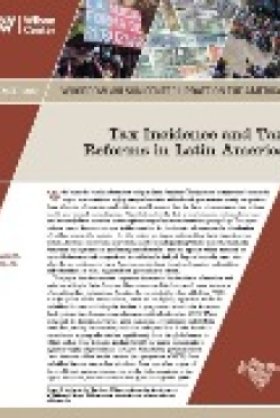Tax Incidence and Tax Reforms in Latin America


Introduction
Who bears the burden of taxation today in Latin America? This question is important because the region now combines highly unequal societies with elected governments nearly everywhere. Some theories of taxation and politics would suggest that in these circumstances, tax reform would aim toward redistribution. Nonetheless, for the last several decades policymakers have paid relatively little attention to the region’s inequality when formulating tax policy. This paper reviews recent literature on tax incidence—that is, the impact of taxes on the distribution of welfare across the society—for the major tax types undergirding Latin American tax systems, for these tax systems as a whole, and for social spending.1 It also asks whether Latin American tax systems are performing satisfactorily—that is, against which standard or by which international comparisons should they be judged. Beyond this, the paper asks what the tax incidence in Latin America reveals about theories of taxation and politics, and what these, in turn, suggest about approaches to reform.
This paper describes various important features of the incidence of taxation and social spending in Latin America. Governments redistribute much more by means of spending than by taxation. As might be expected, the value-added tax (VAT), a major pillar of the revenue base, tends to be slightly regressive, while the individual income tax brings in less but is progressive. Most Latin American fiscal systems have become somewhat more redistributive since 2000. When compared to Europe, however, Latin American governments redistribute much less, mainly because they both tax and spend less. Latin American countries as a group also deviate significantly from the global norm in which higher gross domestic product (GDP) per capita corresponds to a greater weight of government in GDP. Remarkably, governments in Latin America collect less in revenue (as a proportion of GDP) from individual income taxes than do those from any other region of the world; this pattern extends even to the richer countries in the region. Moreover, tax reforms from the 1970s through the 1990s generally entailed additional reliance on indirect (consumption, e.g. VAT) taxes, even as inequality was rising. Finally, the region’s inequality is so great that, although its tax revenues are lower than among OECD countries, the richest households already pay a greater share of all tax revenue in Latin America, complicating reform efforts. The first section of this paper offers historical background and discusses why tax incidence matters more than ever. After a brief introduction to tax and spending incidence, the second part reviews major conclusions of recent empirical work on the primary incidence of spending and taxation, including the incidence of the major types of taxes. The next section considers how to judge Latin American governments’ performance in this area, comparing their fiscal results in various ways to those of European countries, the historical OECD, other regions, and the world at large. Following an empirical summary, the final section discusses two models of fiscal politics with divergent implications for tax reform.
To continue reading, you can download the publication on the link below.
Author

Latin America Program
The Wilson Center’s prestigious Latin America Program provides non-partisan expertise to a broad community of decision makers in the United States and Latin America on critical policy issues facing the Hemisphere. The Program provides insightful and actionable research for policymakers, private sector leaders, journalists, and public intellectuals in the United States and Latin America. To bridge the gap between scholarship and policy action, it fosters new inquiry, sponsors high-level public and private meetings among multiple stakeholders, and explores policy options to improve outcomes for citizens throughout the Americas. Drawing on the Wilson Center’s strength as the nation’s key non-partisan policy forum, the Program serves as a trusted source of analysis and a vital point of contact between the worlds of scholarship and action. Read more




